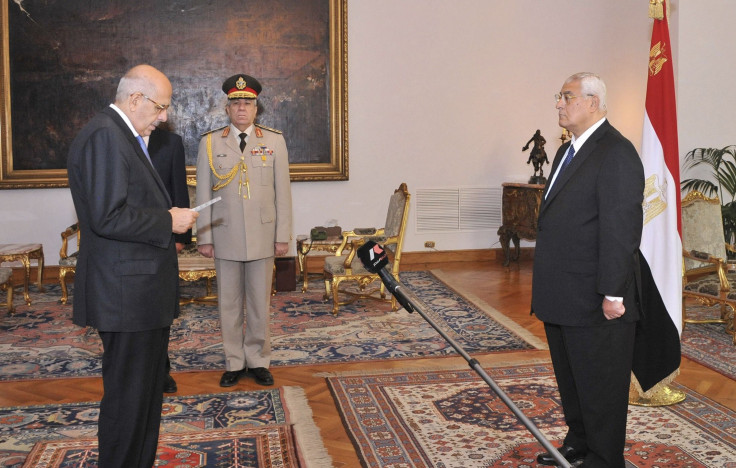Interim Egyptian Prime Minister Names Cabinet; ElBaradei Becomes VP

Egypt's interim prime minister filled top posts Sunday in a Cabinet that is to lead the country under an army-backed "road map" to restore civilian rule following the overthrow of President Mohamed Morsi.
Meanwhile, the government froze the assets of leaders of Morsi’s Muslim Brotherhood.
Hazem el-Beblawi, a 76-year-old liberal economist appointed interim prime minister last week, is tapping technocrats and liberals for an administration to govern under a temporary constitution until parliamentary elections in about six months, Reuters reports.
He named another liberal economist, Ahmed Galal, as finance minister. His job will be to start repairing the state finances and rescue an economy wrecked by two and a half years of political turmoil.
A former ambassador to the United States, Nabil Fahmy, accepted the post of foreign minister, a sign of the importance of the relationship with the superpower that provides $1.3 billion a year in military aid.
Mohamed ElBaradei, a former senior U.N. diplomat, was sworn in Sunday as vice president, a job he was offered last week.
Meanwhile, the U.S. State Department said Sunday that Deputy Secretary William Burns will visit Egypt this week to meet interim government officials and stress the need to end violence and move toward a democratically elected government.
Burns will also hold talks with executives and members of civil society, said a department statement that made no mention of whether he will meet with the military that ousted President Mohamed Morsi or Morsi's Muslim Brotherhood supporters.
"In all these meetings, he will underscore US support for the Egyptian people, an end to all violence, and a transition leading to an inclusive, democratically elected civilian government," the department said in a brief statement.
Sunday marks a week without serious street violence. In the days after Morsi's fall, clashes between the army, his Islamist supporters and Morsi's opponents killed more than 90 people.
In a speech to a hall full of military officers on Sunday, the army chief who removed the president, Gen. Abdel Fattah al-Sisi, justified the takeover. He said the president had lost legitimacy because of mass demonstrations against him.
Sisi said he had tried to avert the need for unilateral action by offering Morsi the option of holding a referendum on his rule, but "the response was total rejection." He insisted the political process remained open to all groups - though the Muslim Brotherhood has shunned dealings with "usurpers."
"Every political force without exception and without exclusion must realize that an opportunity is available for everyone in political life and no ideological movement is prevented from taking part," Sisi said.
Morsi, Egypt's first freely elected president, has been held incommunicado at an undisclosed location since the army removed him from power on July 3, three days after millions marched to demand he resign on the first anniversary of his inauguration.
The authorities have not charged him with a crime but said on Saturday they were investigating complaints against him over spying, inciting violence and wrecking the economy. The public prosecutor said on Sunday that it had ordered the freezing of the assets of 14 Brotherhood and other Islamist leaders.
The Muslim Brotherhood head Mohammed Badie and his deputy Khairat al-Shater are reported to be among them, the BBC reports.
Charges of inciting violence have already been issued against many of the Brotherhood's top figures, although in most cases police have not followed through with arrests. The Brotherhood says the criminal charges are part of a crackdown against it and the authorities are to blame for the violence.
Senior Brotherhood leader Essam El-Erian said some 240 Mursi supporters, jailed since dozens were shot by troops a week ago, had their detentions extended in a closed hearing inside the prison where they are being held. Lawyers were barred.
"How could there not be a single lawyer for 240 defendants?" he asked. "This constitutes a serious violation of all the principles of the rule of law. Where are the honorable judges in Egypt to challenge these violations that insult their robes?"
© Copyright IBTimes 2024. All rights reserved.











